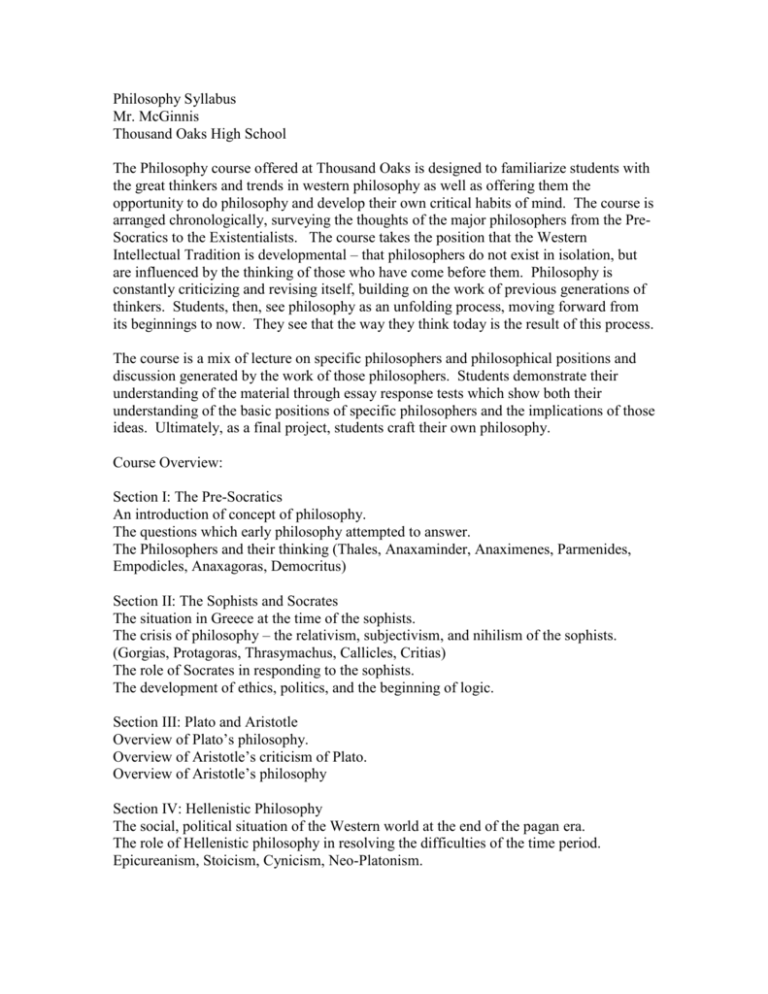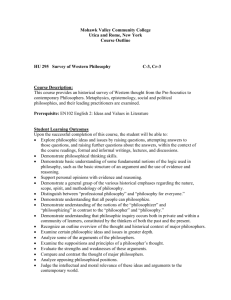Philosophy-overview
advertisement

Philosophy Syllabus Mr. McGinnis Thousand Oaks High School The Philosophy course offered at Thousand Oaks is designed to familiarize students with the great thinkers and trends in western philosophy as well as offering them the opportunity to do philosophy and develop their own critical habits of mind. The course is arranged chronologically, surveying the thoughts of the major philosophers from the PreSocratics to the Existentialists. The course takes the position that the Western Intellectual Tradition is developmental – that philosophers do not exist in isolation, but are influenced by the thinking of those who have come before them. Philosophy is constantly criticizing and revising itself, building on the work of previous generations of thinkers. Students, then, see philosophy as an unfolding process, moving forward from its beginnings to now. They see that the way they think today is the result of this process. The course is a mix of lecture on specific philosophers and philosophical positions and discussion generated by the work of those philosophers. Students demonstrate their understanding of the material through essay response tests which show both their understanding of the basic positions of specific philosophers and the implications of those ideas. Ultimately, as a final project, students craft their own philosophy. Course Overview: Section I: The Pre-Socratics An introduction of concept of philosophy. The questions which early philosophy attempted to answer. The Philosophers and their thinking (Thales, Anaxaminder, Anaximenes, Parmenides, Empodicles, Anaxagoras, Democritus) Section II: The Sophists and Socrates The situation in Greece at the time of the sophists. The crisis of philosophy – the relativism, subjectivism, and nihilism of the sophists. (Gorgias, Protagoras, Thrasymachus, Callicles, Critias) The role of Socrates in responding to the sophists. The development of ethics, politics, and the beginning of logic. Section III: Plato and Aristotle Overview of Plato’s philosophy. Overview of Aristotle’s criticism of Plato. Overview of Aristotle’s philosophy Section IV: Hellenistic Philosophy The social, political situation of the Western world at the end of the pagan era. The role of Hellenistic philosophy in resolving the difficulties of the time period. Epicureanism, Stoicism, Cynicism, Neo-Platonism. Section V: The Emergence of Christianity An understanding of the problems facing Christianity The role of St. Paul, St. Augustine in shaping western thinking. The development of theology. The thinking of Anselm, Aquinas, Ockham Section VI: The Rationalists, Empiricists, and Kant The birth of modern philosophy The Rationalists: Descartes, Spinoza, Leibnitz The focus on innate ideas and the centrality of the reason in coming to absolutely certain conclusions Difficulties inherent in rationalist thinking The Empiricists: Locke, Berkeley, Hume Denial of innate ideas, idea that all knowledge comes through the senses. Difficulties inherent in empiricist thinking Kant’s synthetic resolution of the rationalist/empiricist Section VII: The 19th Century The ideas of: Hegel, Kirkegaard, Marx, Nietzsche, Freud, Bentham, Mill, James Dialectical Idealism, Dialectical Materialism, Existentialism, Psychology, Utilitarianism, Pragmatism Section VIII: The 20th Century The ideas of: Heidegger, Sartre, De Beauvoir, Lacan, Derrida, Foucault Atheistic Existentialism, Feminism, Deconstructionism Grading Scale 95-100 A 73-76 C 90-94 A70-72 C87-89 B+ 67-69 D+ 83-86 B 63-66 D 80-82 B60-62 D77-79 C+ Below 60 F Academic Integrity See the Student Handbook for the statement regarding academic integrity. Attendance and Preparedness Since attendance and preparedness affect your ability to participate in class, coming to class late or without materials will impact your class participation grade Classroom Behavior Students are expected to behave in a respectful manner at all times. Respect for yourself, your fellow students, your teacher, and the subject matter is a prerequisite for this class. Additionally, food and drink are not permitted in the classroom; cell phones and mp3 players are to be off and stored away.







